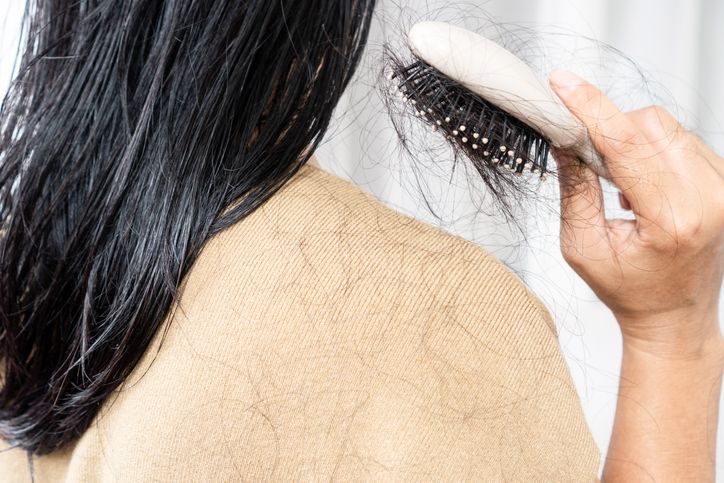
- Home
- Trend
- Weight Loss Strategies
- Acne Tips
- Hair Health Information
- Blemish Removal Tips
- Acne Scar Removal Tips
- Muscle Building Techniques
- Intimate Care Tips
- Postpartum Intimate Care
- Eye Bags Wiki
- Tips for Face Slimming
- Secret of Permanent Hair Removal
- Breast Enlargement Tips
- Cure to Snoring
- Marionette Lines
- Skin-Tightening Secrets
Stress is an unavoidable part of life, affecting our physical and mental well-being in numerous ways. One of the lesser-known impacts of stress is its effect on hair health. Many people experience hair loss, thinning, or shedding as a direct result of stress, a phenomenon often misunderstood and underappreciated. This article delves into the complex relationship between stress and hair loss, exploring how stress hormones disrupt the hair growth cycle, and offering practical solutions, including the F8 Hair Regrowth Treatment, to manage and potentially reverse stress-related hair loss.
The Hair Growth Cycle Explained

To understand how stress affects hair loss, it's important to first grasp the basics of the hair growth cycle. Hair growth involves three main phases:
1. Anagen (Growth Phase): This is the active growth phase where hair follicles produce new hair. It can last from two to six years.
2. Catagen (Transitional Phase): This short phase lasts about two weeks, during which hair growth slows down, and the hair follicle shrinks.
3. Telogen (Resting Phase): During this phase, which lasts about three months, hair falls out, and new hair begins to grow in its place.
In a normal hair cycle, 85-90% of hair follicles are in the anagen phase, while the remaining 10-15% are in the telogen phase. However, stress can disrupt this balance, leading to various forms of hair loss.
Stress Hormones and Their Role in Hair Loss
When the body experiences stress, it releases stress hormones like cortisol. While these hormones are essential for the body's stress response, they can have detrimental effects on hair follicles. Chronic stress, in particular, can push a large number of hair follicles into the telogen phase prematurely, leading to a condition known as telogen effluvium. This results in noticeable hair shedding and thinning across the scalp.
Telogen Effluvium is one of the most common types of stress-related hair loss. It's typically characterized by diffuse hair loss, meaning hair sheds evenly across the entire scalp rather than in patches. The condition is usually temporary, but it can lead to significant thinning if the stress is not managed.
免費體驗
F8 Hair Regrowth Treatment
1 Minute Self-Registration
Date should not be before minimal date
Types of Stress-Related Hair Loss
Stress-induced hair loss can manifest in different forms, each with its own underlying mechanisms:
Telogen Effluvium
As mentioned earlier, telogen effluvium is caused by stress pushing hair follicles into the resting phase prematurely. This results in increased shedding and noticeable thinning. While telogen effluvium is often temporary, lasting for about six months, chronic stress can lead to a prolonged condition known as chronic telogen effluvium, which may last for years.
Alopecia Areata
Alopecia areata is an autoimmune disease where the immune system attacks hair follicles, leading to patchy hair loss. While the exact cause of alopecia areata is unknown, stress is believed to be a significant trigger. In severe cases, it can progress to alopecia totalis (complete scalp hair loss) or alopecia universalis (total body hair loss).
Trichotillomania (Hair Pulling Disorder)
Trichotillomania is a psychological condition where individuals compulsively pull out their hair as a way of coping with stress, anxiety, or other emotional distress. This can lead to noticeable hair thinning and bald patches. Unlike other forms of hair loss, trichotillomania is often associated with underlying mental health issues and may require psychological treatment.
How Stress Hormones Affect Hair Follicles?
Alt text: An image of a man has his hair checked and realise he has hair loss issue https://www.istockphoto.com/photo/macro-photography-of-gray-hair-and-black-hair-on-scalp-gm1152230710-312533807
The adrenal glands produce cortisol and other stress hormones in response to stress. These hormones have several effects on the body, including altering the normal hair cycle. High levels of cortisol can reduce hair growth and increase hair shedding by shortening the anagen phase and prolonging the telogen phase. This disruption in the hair growth cycle can lead to a noticeable decrease in hair volume and density.
Hair Follicle Stem Cells
Hair follicle stem cells are responsible for regenerating hair follicles and promoting new hair growth. Chronic stress can negatively affect these stem cells, reducing their ability to regenerate and leading to slower hair regrowth. Over time, this can contribute to hair thinning and further hair loss.
Immune System
Stress also affects the immune system, potentially triggering autoimmune responses that attack hair follicles. This is particularly relevant in conditions like alopecia areata, where stress-induced immune dysregulation leads to hair loss.
Identifying Stress-Related Hair Loss
Recognizing the signs of stress-related hair loss early on is essential for taking the right steps toward managing and preventing further hair loss. Stress-induced hair loss can manifest in several ways, and understanding these symptoms can help you differentiate it from other types of hair loss. Here’s how to identify stress-related hair loss:
1. Increased Shedding
One of the most common and noticeable signs of stress-related hair loss is an increase in hair shedding. You might observe more hair falling out when you brush, wash, or style your hair.
This shedding can be alarming, especially if you start seeing more hair strands in your shower drain, on your pillow, or scattered around your home. Stress can push a large number of hair follicles into the resting (telogen) phase, leading to increased hair shedding, a condition known as telogen effluvium.
2. Thinning Hair
Another indicator of stress-related hair loss is the gradual thinning of your hair. You may notice that your hair doesn’t feel as thick or voluminous as it used to, and your scalp may become more visible, especially in areas like the crown or temples.
This thinning can occur evenly across your scalp or be more pronounced in specific areas, depending on how your body reacts to stress. Unlike other types of hair loss that are more localized, stress-induced thinning often affects the entire scalp, making it more difficult to hide.
3. Patchy Hair Loss
In more severe cases, stress can trigger conditions like alopecia areata, an autoimmune disorder where the immune system attacks hair follicles, leading to patchy hair loss. This type of hair loss is characterized by bald spots or areas of significant thinning on the scalp or other parts of the body, such as the eyebrows or beard.
These patches can appear suddenly and may vary in size, ranging from small, coin-sized areas to larger, more noticeable bald spots. If you notice these patches, it’s important to seek medical advice, as they could indicate an underlying autoimmune condition exacerbated by stress.
4. Behavioral Signs: Trichotillomania
Stress-related hair loss can also manifest through behavioral changes, such as trichotillomania, a condition where individuals feel an irresistible urge to pull out their hair. This compulsion often arises as a coping mechanism in response to stress or anxiety. If you or someone you know is constantly tugging at their hair or if you find patches of missing hair accompanied by a sense of relief or satisfaction after pulling, it may be a sign of trichotillomania. This condition can lead to noticeable hair loss and may require both psychological and medical intervention.
免費體驗
F8 Hair Regrowth Treatment
1 Minute Self-Registration
Date should not be before minimal date
The Long-Term Effects of Stress on Hair Health

Chronic stress not only leads to immediate hair loss but can also have long-lasting effects on your hair health:
Impact on Hair Follicles
Prolonged stress can lead to the miniaturization of hair follicles, a process where the follicles shrink over time and produce thinner, weaker hair strands. This can result in persistent hair thinning and reduced hair volume.
Hair Follicle Stem Cell Damage
Chronic stress can damage hair follicle stem cells, reducing their ability to regenerate hair. Over time, this can lead to a decrease in hair density and slower hair regrowth, making it harder to recover from hair loss.
Scalp Health and Hair Growth
Stress can also negatively affect scalp health, leading to conditions like dandruff, scalp inflammation, and dryness. An unhealthy scalp environment can further contribute to hair loss and hinder hair growth.
Managing and Treating Stress-Related Hair Loss
While stress-related hair loss can be distressing, it is often reversible with proper management and treatment. Here’s how you can take control:
Stress Management Techniques
The most effective way to combat stress-related hair loss is to address the root cause: stress itself. Incorporating stress management techniques into your daily routine can significantly reduce stress levels and help restore your hair’s natural growth cycle.
• Mindfulness and Meditation: Practicing mindfulness and meditation can help reduce stress hormones, calm the mind, and improve overall well-being.
• Regular Exercise: Physical activity is a powerful stress reliever that also promotes healthy blood circulation, including to the scalp, which can support hair growth.
• Healthy Diet: A balanced diet rich in essential nutrients like vitamins, minerals, and antioxidants supports hair health and helps combat the effects of stress.
• Adequate Sleep: Ensuring you get enough sleep is crucial for stress management and overall health, including hair health.
2. Topical Treatments and Hair Care
Using the right hair care products can also help manage and reduce stress-related hair loss. Here’s what to consider:
• Topical Treatments: Products containing minoxidil, a well-known hair loss treatment, can help stimulate hair growth and reduce hair shedding.
• Gentle Hair Care: Avoid harsh hair treatments, heat styling, and tight hairstyles that can further stress your hair follicles. Instead, opt for gentle shampoos, conditioners, and natural hair masks that nourish your scalp and hair.
• Scalp Massages: Regular scalp massages can promote blood circulation to the hair follicles, helping to stimulate hair growth and reduce stress.
3. The F8 Hair Regrowth Treatment
For those dealing with significant hair loss due to stress, the F8 Hair Regrowth Treatment offers a powerful solution. This advanced laser treatment uses low-energy laser beams in combination with a specialized serum to stimulate blood circulation and promote hair regrowth.
• How It Works: The F8 Treatment targets the hair follicles directly, strengthening them and promoting new hair growth. By improving blood flow to the scalp, the treatment ensures that hair follicles receive the essential nutrients they need to thrive.
• Benefits for Stress-Related Hair Loss: The F8 Treatment is particularly effective for those experiencing stress-induced hair loss, as it addresses both the physical and psychological aspects of hair loss. By restoring the health of hair follicles and encouraging new growth, the treatment can significantly reduce hair thinning and shedding.
• Complementary to Other Treatments: The F8 Hair Regrowth Treatment can be used alongside other hair care routines and stress management techniques, providing a comprehensive approach to combating hair loss.
Practical Steps to Reduce Stress and Protect Your Hair

Incorporating stress management into your daily life not only improves your overall health but also plays a key role in maintaining healthy hair. Here’s how you can take proactive steps:
1. Develop a Relaxing Hair Care Routine
Creating a calming hair care routine can serve as a form of self-care, helping to reduce stress while improving your hair health:
• Weekly Hair Masks: Use a hydrating hair mask weekly to nourish your hair and scalp. Ingredients like avocado oil, shea butter, and plant oils can deeply condition your hair, making it more resilient to stress.
• Scalp Treatments: Incorporate scalp treatments into your routine to promote healthy hair growth. Massaging your scalp with essential oils like rosemary or peppermint can reduce stress and stimulate hair follicles.
• Use the Right Products: Choose hair care products that are free from harsh chemicals and sulfates. Opt for natural, nourishing ingredients that protect your hair and scalp from damage.
2. Prioritize Stress Management
Implementing daily stress management techniques can have a profound impact on your hair health:
• Daily Meditation: Dedicate a few minutes each day to mindfulness meditation. Focus on your breathing and let go of any stress or anxiety. This practice not only reduces cortisol levels but also helps you feel more centered and calm.
• Physical Activity: Engage in regular physical exercise, such as yoga, walking, or swimming. Exercise releases endorphins, which act as natural stress relievers and promote overall well-being.
• Healthy Eating: Maintain a balanced diet rich in vitamins, minerals, and antioxidants. Foods like leafy greens, nuts, seeds, and fatty fish support hair health and reduce the impact of stress on your body.
免費體驗
F8 Hair Regrowth Treatment
1 Minute Self-Registration
Date should not be before minimal date
Taking Control of Stress-Related Hair Loss!
While stress-related hair loss can be challenging to deal with, it’s important to remember that it is often reversible with the right approach. By understanding how stress affects your hair, implementing effective stress management techniques, and using targeted treatments like the F8 Hair Regrowth Treatment, you can restore your hair’s health and vitality.
Start your journey to healthier hair today by exploring the options available to you, including the F8 Hair Regrowth Treatment. With the right care and attention, you can overcome stress-related hair loss and enjoy the confidence that comes with having strong, vibrant hair.
F8 Hair Regrowth Treatment免費體驗
F8 Hair Regrowth Treatment
1 Minute Self-Registration
Date should not be before minimal date
FAQ

1. How does stress lead to hair loss?
Stress can lead to hair loss through a process called telogen effluvium. During periods of extreme stress, the body’s stress hormone levels rise, causing a significant number of hair follicles to prematurely enter the resting (telogen) phase of the hair growth cycle. This results in increased hair shedding and temporary hair loss. The extended resting phase can disrupt the normal hair growth cycle, leading to noticeable thinning and shedding.
2. What is the difference between stress-induced hair loss and other types of hair loss?
Stress-induced hair loss, or telogen effluvium, is generally temporary and is characterized by diffuse thinning and shedding of hair across the scalp. It is often triggered by a major stressful event, such as a traumatic experience or prolonged periods of stress. In contrast, conditions like female pattern hair loss or male pattern baldness are usually hereditary and involve a gradual, pattern-based thinning of hair over time. Stress-related hair loss is different from these conditions as it usually resolves once the underlying stress is managed and the hair follicles return to their normal growth cycle.
3. How can F8 Hair Regrowth Treatment help with stress-related hair loss?
F8 Hair Regrowth Treatment can be an effective complementary solution for addressing stress-related hair loss. By utilizing low-energy laser beams to stimulate blood circulation and promote hair follicle activity, F8 Hair Regrowth Treatment helps to restore and invigorate hair growth. This treatment can support the natural hair growth cycle, counteracting the effects of stress-induced hair shedding and enhancing overall hair health.
4. Can stress hormones affect hair growth and what can be done to manage it?
Yes, elevated stress hormone levels, particularly cortisol, can adversely affect hair growth. High cortisol levels can disrupt the normal hair growth cycle, leading to hair follicles entering the extended resting phase, which results in increased shedding and reduced hair growth. To manage stress hormones and their impact on hair health, it's essential to practice effective stress management techniques such as regular exercise, mindfulness, and a balanced diet.
5. How can F8 Hair Regrowth Treatment aid in restoring hair growth after experiencing stress-induced hair loss?
F8 Hair Regrowth Treatment is designed to address various factors contributing to hair loss, including stress-induced thinning. The treatment works by using advanced low-energy laser technology to enhance blood circulation and increase the delivery of essential nutrients to the hair follicles. This process helps to rejuvenate stressed follicles, accelerate hair regrowth, and restore hair density.








